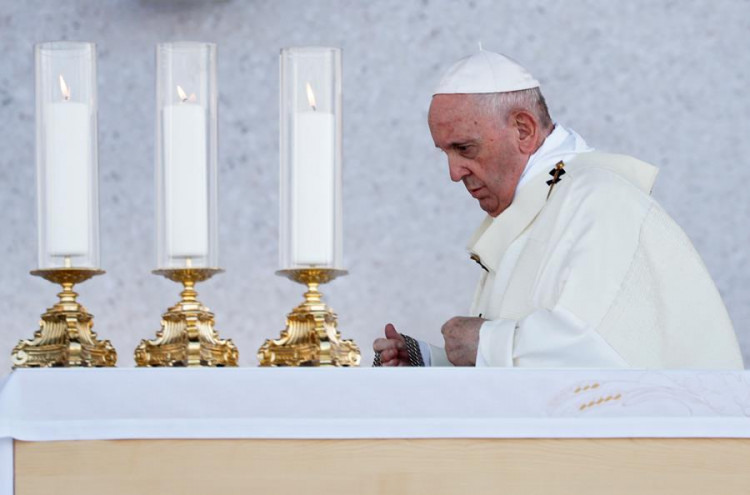Pope Francis has sparked outrage in Ukraine and among its European allies after suggesting that the war-torn country should have the "courage of the white flag" and negotiate an end to the conflict with Russia. In an interview with Swiss broadcaster Radio Télévision Suisse (RTS) published on Saturday, the pontiff's comments were met with swift condemnation from Ukrainian officials and religious leaders, who accused him of engaging in "virtual mediation" and failing to recognize the gravity of the situation.
When asked whether negotiations would "legitimize the stronger party," Francis replied, "That is one interpretation. But I believe that the stronger one is the one who sees the situation, who thinks of the people, who has the courage of the white flag, to negotiate." He added that "today, negotiations are possible with the help of international powers."
Ukraine's Foreign Minister Dmytro Kuleba responded forcefully to the pope's remarks, stating on social media, "Our flag is a yellow and blue one. This is the flag by which we live, die, and prevail. We shall never raise any other flags." He emphasized that "the strongest is the one who, in the battle between good and evil, stands on the side of good rather than attempting to put them on the same footing and call it 'negotiations'."
Father Sviatoslav, the Father and Head of the Ukrainian Greek Catholic Church, echoed these sentiments while speaking to Ukrainians in New York on Saturday. "Ukraine is exhausted, but it is standing and will stand! Believe me, no one even thinks of surrender, even in the places where fighting is ongoing today," he said, according to a statement from the Greek Catholic Church.
Following the backlash, the Director of the Holy See Press Office, Matteo Bruni, attempted to clarify the pope's comments, explaining that Francis had picked up the image of the white flag "to indicate a cessation of hostilities, a truce reached with the courage of negotiation," and not surrender as some may have interpreted his remarks.
However, the clarification did little to quell the anger among European leaders. Poland's Foreign Minister Radosław Sikorski criticized the pope's comments on X (formerly Twitter), saying, "How about, for balance, encouraging Putin to have the courage to withdraw his army from Ukraine. Peace would immediately ensue without the need for negotiations."
Latvia's President Edgars Rinkēvičs also weighed in, stating, "My Sunday morning take: One must not capitulate in [the] face of evil, one must fight it and defeat it, so that the evil raises the white flag and capitulates."
Alexandra Valkenburg, the head of the EU delegation to the Holy See, reiterated that "Russia started an illegal and unjustified war against Ukraine two years ago" and that Russia "can end this war immediately" by respecting Ukraine's sovereignty and territorial integrity.
This is not the first time Pope Francis has upset Ukrainian officials during the war. Last year, he called on Russian youth to take pride as heirs of tsars like Peter the Great, a figure held up by Russian President Vladimir Putin as an example to justify his actions in Ukraine.
As the conflict continues, with tens of thousands of Ukrainians killed and the country seeking to recapture all its territory seized by Russia, the pope's comments have highlighted the deep divisions and sensitivities surrounding the war. While Francis may have intended to call for a peaceful resolution, his words have been interpreted by many as a misguided attempt at mediation that fails to acknowledge the reality on the ground and the suffering endured by the Ukrainian people.




